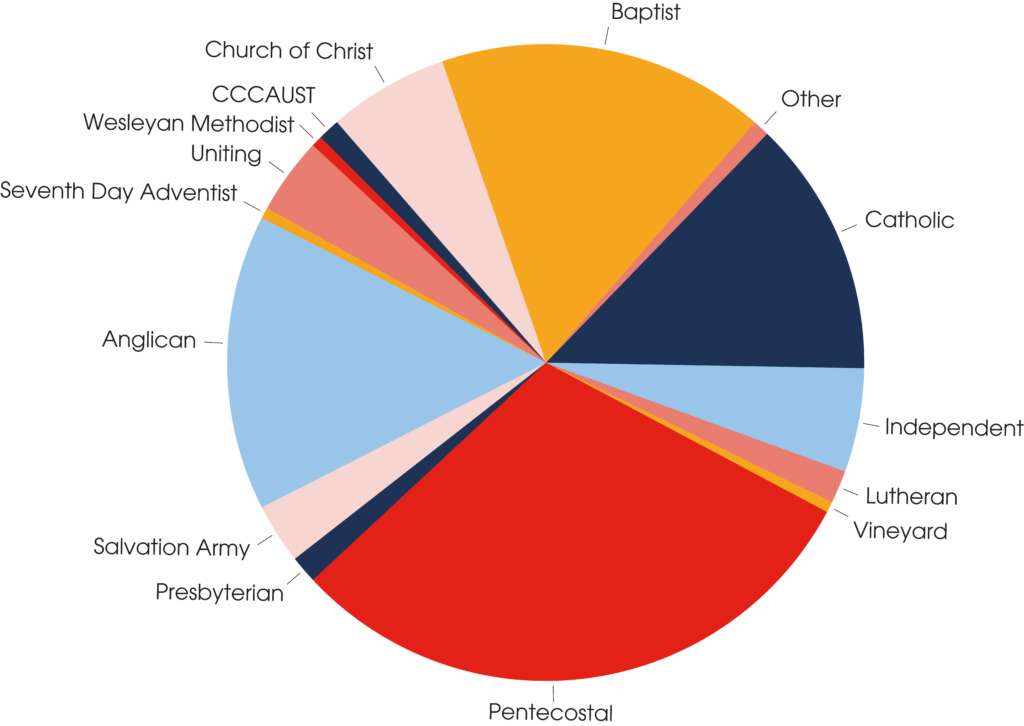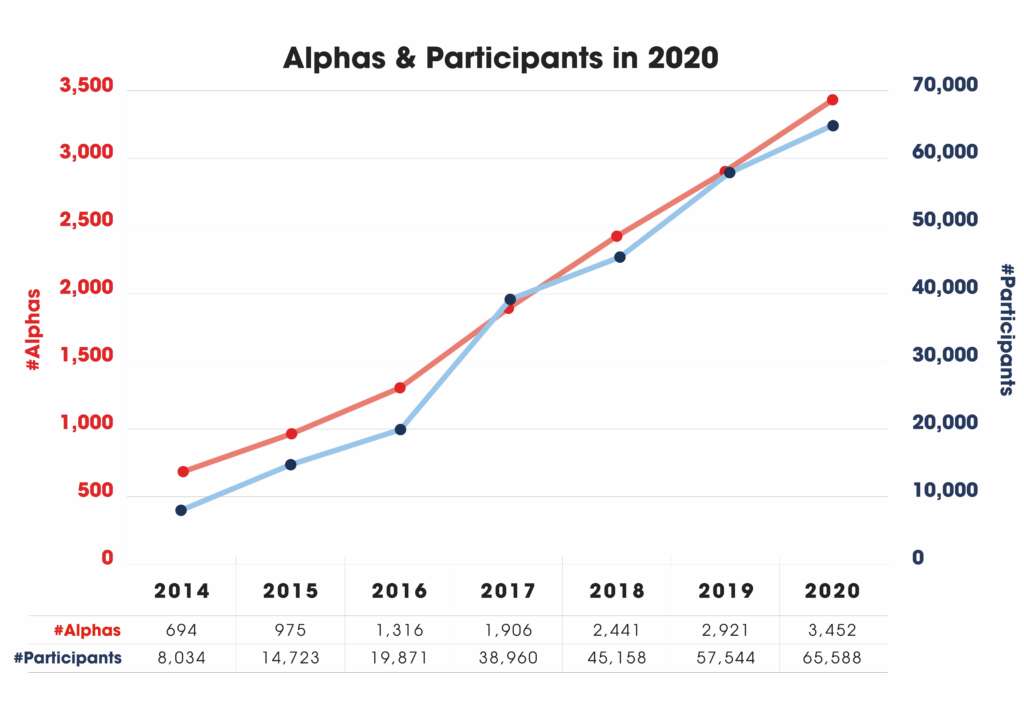The roaring success of online courses has helped Alpha Australia record a year of surging growth, as people rushed to seek answers to life, faith and meaning in a COVID-hit world where they no longer feel in control.
According to the 2021 Alpha Australia IMPACT Report, 65,538 people took part in 3,452 courses in 2020, a 14 per cent increase on last year. But the big surprise was the whopping 50,000 who participated in a new online version of the evangelistic course that traditionally started with people sharing dinner.
Alpha Online appears to be the beer that refreshes the parts other beers cannot reach, in the words of a famous Heineken advertising slogan.
Melinda Dwight, National Director of Alpha Australia, said she didn’t believe Alpha would work online, without the sharing of food or people being able to be together, and she was humbled to be proved wrong.
 The unexpectedly high take-up of Alpha Online confirms that a real sense of community can be established online. And, in reaching new audiences, it appears to be the beer that refreshes the parts other beers cannot reach, in the words of a famous Heineken advertising slogan.
The unexpectedly high take-up of Alpha Online confirms that a real sense of community can be established online. And, in reaching new audiences, it appears to be the beer that refreshes the parts other beers cannot reach, in the words of a famous Heineken advertising slogan.
“The introduction of Alpha Online has led to the inclusion of people previously unable or unwilling to physically go to a church. In this way, Alpha continues to overcome barriers to faith,” said Dwight.
“You’ve got people with young kids who can’t go out – this means that they can both do it. People who are disabled, people who find it hard to drive at night – it’s just really reaching a different audience online, which has been amazing.”
Having an online course available makes it easy for people to invite their friends and family to do it together, she says, citing a church in Melbourne that has started running Alpha globally in Mandarin.
“They’re in their home so it’s easy to express things straight away. You don’t have to build up trust as quickly. And they can turn their video off or their audio off – they are totally empowered … they’re thinking, ‘What have I got to lose? I’ll try that for an hour. I’ll have a chat about who Jesus is; that will be interesting!’ And people say, ‘Oh, I think Jesus was an alien.’ And, rather than going ‘You’re wrong!’ everyone goes, ‘Oh, that’s interesting! What does everybody else think?’ So it’s supposed to be like a good dinner party.”
“Alpha continues to overcome barriers to faith.” – Melinda Dwight
The relational aspect remains a key ingredient even in Alpha Online, with participants in the same area connecting during the week at cafes and parks and then going to church together on Sundays and having coffee afterwards.
“Many people who have been on Alpha Online have never been to church, but at least if they’ve got some friends to sit with, that helps. So it’s the personal connection as well.”
Alpha is unique in that it is used across the denominational spectrum. It involves a series of interactive sessions exploring faith in Jesus in a friendly, open and welcoming environment. Since it began in 1977 at Holy Trinity Brompton in London, 26 million people worldwide have done the course, of whom 600,000 are in Australia.
Dwight says an important driver of growth happened five or so years ago when Alpha moved to work solely with churches rather than individuals. This slowed progress in scale but meant there was a natural progression for new believers in the church after the course.
 She explains that Alpha bridges denominational differences by consulting widely with theological experts to ensure the language is appropriate in different contexts and that the jokes will fly in Australia.
She explains that Alpha bridges denominational differences by consulting widely with theological experts to ensure the language is appropriate in different contexts and that the jokes will fly in Australia.
“Catholics, Baptists, Anglicans, and Pentecostals are the bigger denominations that we work with. So you don’t really think of Hillsong Church and the Catholics having a huge amount in common, but in Alpha, they come together,” says Dwight.
With 49 per cent of Australians saying they never have a spiritual conversation, but 70 per cent of Australians surveyed privately saying they pray, according to Dwight, she deduces there is a strong desire to find a safe place where every question is respected and every story valid.
Yet Dwight confesses that Alpha’s bold vision to reach 100,000 participants in 2021 will require a miracle. Currently, the figure is sitting at 53,000. The biggest obstacle to reaching this goal is finding churches that are interested in evangelism, she says.
“If you can get 20 per cent of a denomination that is interested in evangelism and operating it, that’s a game-changer,” she said.
“Globally, the figures are between 16 and 20 per cent. And I thought that would be easier [to find outward-looking churches], and it’s harder than I thought.”
Other churches declare “this is the greatest season of evangelism we’ve ever had.”
She praises the Australian Christian Churches as the denomination with the biggest traction at the moment. “They’ve got about 25 per cent of their churches running Alpha at least once.”
A disappointing number of churches are more interested in maintenance than evangelism – they just want to get back to normal after COVID and get their people back in the room. And yet other churches declare, “this is the greatest season of evangelism we’ve ever had” and are looking at church planting.
“So they’re coming out on mission saying ‘Let’s plant churches. What are we going to do? How are we going to reach people? How are we going to have a digital church plant? What is that going to look like? How are we going to connect?’ So we want to help everyone help bridge those gaps.”
Key points from the 2021 Alpha Australia IMPACT Report:
- 1,539 churches and organisations ran Alpha in 2020
- More than 370 Alphas in a Catholic context ran in 2020 for more than 8,000 people, a 30 per cent growth from 2019
- 26,853 young people tried Alpha at 1024 Youth Alphas, of which 394 ran online.
- As of May 2021, 220 Alpha Youth Series had been registered and were running in Australian schools, with 31 schools running the series for the first time.
- Alpha Emerging Leaders Network continues to grow with 300-plus Australian church leaders connected from diverse denominations.
Email This Story
Why not send this to a friend?


